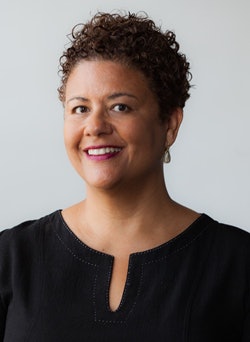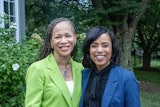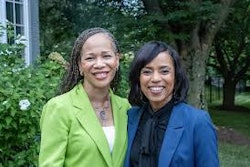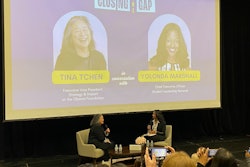 In January 2015, Elizabeth Alexander was named the inaugural Frederick Iseman Professor of Poetry at Yale College. (Photo by Rachel Eliza Griffiths)
In January 2015, Elizabeth Alexander was named the inaugural Frederick Iseman Professor of Poetry at Yale College. (Photo by Rachel Eliza Griffiths)Growing up in Washington, D.C., professor Elizabeth Alexander was raised in a family of influential leaders. Her father served as the U.S. secretary of the Army and Equal Employment Opportunity Commission chairman, her grandfather served as treasurer at the Tuskegee Institute, her mother was a professor of history and even her great-aunt was an educator.
“I was taught — as so many of us Black children were — that education was something that could never be taken from you and that education was crucial, because as the old saying goes, we need to be very prepared for whatever might come our way,” says the 1984 Yale alum.
As a child, the seeds of storytelling were planted through her love for reading and hearing tales from others.
As an adult, Alexander has blossomed into an essayist, poet and playwright whose prose has taken her from prestigious university lecture halls to perhaps the grandest of stages: the Washington Mall at the 2009 presidential inauguration of the first African-American president.
In January 2015, she was named the inaugural Frederick Iseman Professor of Poetry at Yale College. Granted by Iseman, an American businessman and Yale alumnus, it is the first endowed chair at the institution dedicated solely to the field of poetry.
“What I think is very exciting about this position is, first of all, Mr. Iseman gave all of that money to say that poetry is important and to uphold the art,” says Alexander. “Then at Yale, they said the person who would be representative of the excellence and importance of poetry would not just be me, but would be an African-American poet — a feminist thinker, someone who is committed to Black culture. That’s what felt very forward-looking and exciting to me.”
It wasn’t until her undergraduate years, though, that she discovered her poetic voice. While studying at Boston University, Alexander frequently wrote what she referred to as “word clouds.” With insight from professor and Nobel Prize-winning poet Derek Walcott, her clouds became clear.
“He said, ‘Well if you learned about line breaks then you’d understand that what you’re really trying to do is write poems,’ so it was quite a eureka moment, I must say, to have him write out my word clouds with line breaks and see that I was making poems,” Alexander says. “So I immediately and very intensely set out on an apprenticeship.”
She received an M.A. from Boston University in 1987 and followed up with a Ph.D. in English from the University of Pennsylvania in 1992.
Over the years, Alexander has written more than a half-dozen books, essays and plays delving into issues of race, gender, politics, history and motherhood. Of her many accolades, Alexander’s book American Sublime was shortlisted for the Pulitzer Prize, and, in 2007, she was awarded the first Jackson Poetry Prize.
While Alexander never thought she’d write a memoir so soon, she did just that with the release of The Light of the World in April 2015. The book was conceived after the sudden death of her husband at the age of 50. “I think that sometimes life sends you in a direction that you didn’t expect and so I feel fortunate to have been able to meet that with my art,” Alexander says.
Her most notable achievement as a teacher thus far came at the University of Chicago. There she received the Quantrell Award for Excellence in Undergraduate Teaching, one of the nation’s oldest prizes for undergraduate teaching.
“Many students had to write accounts of my teaching, what they learned from me and what happened in our classroom,” she says. “It’s hard to be a good teacher and that was one that I let myself feel proud about.”
Alexander’s journey at Yale came full circle in 2000 when she joined the faculty. She has taught various courses at the institution, covering subjects from African-American poetry and 20th century literature to drama and introduction to African-American studies.
“It’s really nice to see how diverse the student body is at Yale now,” she says. “I teach some students who are the children of Black women alum — that would not have been historically possible when I went to school, so we mark the little increments of change.” Yale has a historically strong African-American studies department, says Alexander, who is aware that, as as professor, she sits on the shoulders of giants.
“Yale African-American studies was a place where in the late ’70s Toni Morrison taught, where Amiri Baraka taught, painter Roman Bertan taught, where the poet Jay Wright taught; so I think that the fact that the arts, which are such an integral part of our intellectual tradition, has been so recognized in our department is really important,” Alexander notes.
In 2008, she became chair of the school’s Department of African American Studies. For four years, Alexander furthered the institution’s “commitment to understanding the culture, the history and the social movements of the people of the African diaspora,” she says.
As she leaves her mark in higher education, mentorship remains an integral duty for Alexander.
“If you’ve made your way a little bit through a door, you’re supposed to keep the door open,” she says. “I think that’s a very simple principle; not one which deserves extra heroics, but it does take time.”















